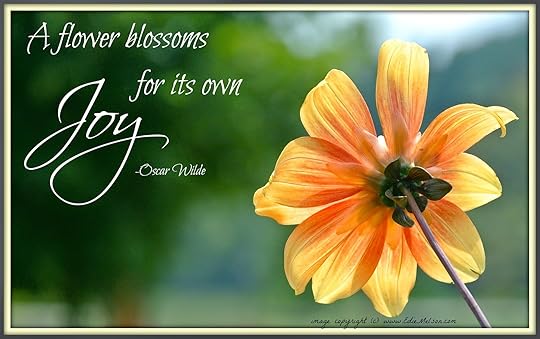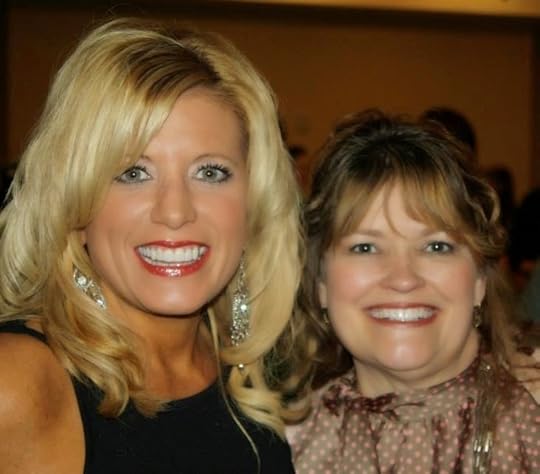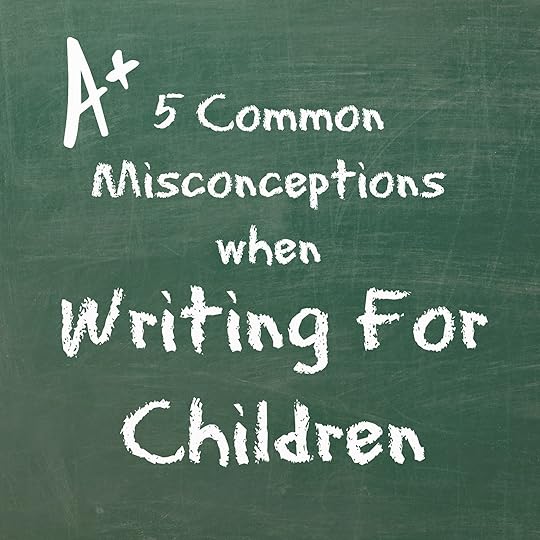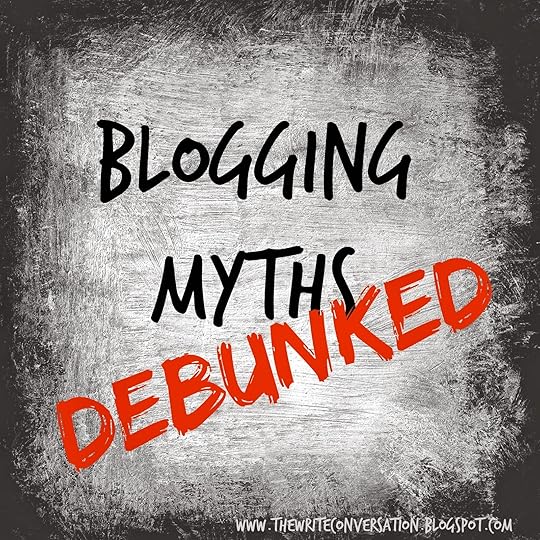Edie Melson's Blog, page 402
August 30, 2014
What Makes You Blossom?
I love this quote by Oscar Wilde because it makes me stop and think. So often we blossom because we're living up to expectations. So my question for you today is this, "When was the last time you blossomed just for the joy of it?"
 A flower blossoms for its own joy - Oscar WildeShare your thoughts in the comment section below.
A flower blossoms for its own joy - Oscar WildeShare your thoughts in the comment section below.
I also invite you to use this image any way you like online. Post it to your blog, share it on Facebook, Twitter, Pinterest, anywhere you'd like. All I ask is that you keep it intact, with my website watermark visible.
Don't forget to join the conversation!Blessings,Edie
TWEETABLE
Is it joy that makes you blossom...or something else - via @EdieMelson #joy #lifequotes (Click to Tweet)
 A flower blossoms for its own joy - Oscar WildeShare your thoughts in the comment section below.
A flower blossoms for its own joy - Oscar WildeShare your thoughts in the comment section below.I also invite you to use this image any way you like online. Post it to your blog, share it on Facebook, Twitter, Pinterest, anywhere you'd like. All I ask is that you keep it intact, with my website watermark visible.
Don't forget to join the conversation!Blessings,Edie
TWEETABLE
Is it joy that makes you blossom...or something else - via @EdieMelson #joy #lifequotes (Click to Tweet)
Published on August 30, 2014 01:00
August 29, 2014
To Outline or Not—Which is Better?
by Bruce Brady @BruceDBrady
 Two types of writers in this world, outliners and intuitive!In the past year I’ve heard a lot of writer discussions, and passionate arguments, about whether to outline or not.
Two types of writers in this world, outliners and intuitive!In the past year I’ve heard a lot of writer discussions, and passionate arguments, about whether to outline or not.
Some of you may be thinking, “Well that’s a no-brainer.” But is it? Those who have taught and argued that outlining is the best way to write range from beginning writers to editors to best-selling authors. The same is true for those who advocate in favor of intuitive writing.
There are two types of writers in this world. Those who map out their stories before they ever begin (outliners), and those who hear the voices (intuitive writers).Outliners These tout the virtues of knowing the end of their story before they begin. Once they have their character profiles fleshed out and their plots clearly defined, the hard work is done. They can start spinning their stories as dictated by the outlines. They claim that this method calls for fewer rewrites.
Intuitive These writers start with story ideas that may not have clear plots, or even clear endings. They could use outlines for clarity, but feel that doing so would restrict flexibility. These writers dialogue with their characters and adjust their stories based on conversations. Their first drafts are essentially an exercise in free-flowing word association, which becomes their outlines for the rewrites.
Whenever I try to outline, I find myself asking “what if” questions that force me to create a whole new outline—or at least modify the one I’ve started. Also, my stories come to me in scenes that aren’t necessarily chronological, complicating the outline process. These challenges usually stifle my creativity, and frustrate me to the point of giving up.
 So which process is best?
So which process is best?
Personal experience and my interactions with agents, editors and other writers have led me to the conclusion that both are good. It’s like when my wife and I travel. She prefers to know where we are going and where we’ll spend each night before we start. I prefer allowing our journey to determine our destination and accommodations.
In other words, it’s not the method but the writer’s personality that will determine whether outlining or intuitive writing is best.
Both methods have their merits and challenges. If you tend to think in terms of “First there’s A, then B followed by C, you’ll probably do your best work by outlining. If, like me, you’re often chatting with your characters and your stories don’t come in a linear flow, then the intuitive approach is probably your best option. But that’s just my opinion.
So which method do you prefer? Why?
Don't forget to join the conversation!
TWEETABLESTo Outline or Not to Outline - @BruceDBrady weighs in on this #writing debate on @EdieMelson (Click to Tweet)
So which process is best for #writers—outlining or not? @BruceDBrady shares his thoughts on @EdieMelson (Click to Tweet)
 Bruce Brady is an author, writer and playwright. His work has appeared in Focus on the Family’s Thriving Family, www.ChristianDevotions.us, and on stage. Currently, Bruce is working on a Young Adult Novel about a boy who must deal with the death of his dad, being bullied, and helping his mom through her grief. His first five pages took third place in the ACFW South Carolina Chapter’s “First Five Pages” contest.
Bruce Brady is an author, writer and playwright. His work has appeared in Focus on the Family’s Thriving Family, www.ChristianDevotions.us, and on stage. Currently, Bruce is working on a Young Adult Novel about a boy who must deal with the death of his dad, being bullied, and helping his mom through her grief. His first five pages took third place in the ACFW South Carolina Chapter’s “First Five Pages” contest.
When he’s not writing, Bruce spends time learning from and helping other writers. He serves as Mentor of Word Weavers International’s Online Chapter, and as a member of Cross ‘N’ Pens, The Writer’s Plot, ACFW’s National and South Carolina Chapters.
“My dream is to entertain my readers and give them hope as they travel the rocky road of life.”
Connect with Bruce on his blog, The Write Voyage, Facebook, Twitter, Google+, and Pinterest.
 Two types of writers in this world, outliners and intuitive!In the past year I’ve heard a lot of writer discussions, and passionate arguments, about whether to outline or not.
Two types of writers in this world, outliners and intuitive!In the past year I’ve heard a lot of writer discussions, and passionate arguments, about whether to outline or not.Some of you may be thinking, “Well that’s a no-brainer.” But is it? Those who have taught and argued that outlining is the best way to write range from beginning writers to editors to best-selling authors. The same is true for those who advocate in favor of intuitive writing.
There are two types of writers in this world. Those who map out their stories before they ever begin (outliners), and those who hear the voices (intuitive writers).Outliners These tout the virtues of knowing the end of their story before they begin. Once they have their character profiles fleshed out and their plots clearly defined, the hard work is done. They can start spinning their stories as dictated by the outlines. They claim that this method calls for fewer rewrites.
Intuitive These writers start with story ideas that may not have clear plots, or even clear endings. They could use outlines for clarity, but feel that doing so would restrict flexibility. These writers dialogue with their characters and adjust their stories based on conversations. Their first drafts are essentially an exercise in free-flowing word association, which becomes their outlines for the rewrites.
Whenever I try to outline, I find myself asking “what if” questions that force me to create a whole new outline—or at least modify the one I’ve started. Also, my stories come to me in scenes that aren’t necessarily chronological, complicating the outline process. These challenges usually stifle my creativity, and frustrate me to the point of giving up.
 So which process is best?
So which process is best? Personal experience and my interactions with agents, editors and other writers have led me to the conclusion that both are good. It’s like when my wife and I travel. She prefers to know where we are going and where we’ll spend each night before we start. I prefer allowing our journey to determine our destination and accommodations.
In other words, it’s not the method but the writer’s personality that will determine whether outlining or intuitive writing is best.
Both methods have their merits and challenges. If you tend to think in terms of “First there’s A, then B followed by C, you’ll probably do your best work by outlining. If, like me, you’re often chatting with your characters and your stories don’t come in a linear flow, then the intuitive approach is probably your best option. But that’s just my opinion.
So which method do you prefer? Why?
Don't forget to join the conversation!
TWEETABLESTo Outline or Not to Outline - @BruceDBrady weighs in on this #writing debate on @EdieMelson (Click to Tweet)
So which process is best for #writers—outlining or not? @BruceDBrady shares his thoughts on @EdieMelson (Click to Tweet)
 Bruce Brady is an author, writer and playwright. His work has appeared in Focus on the Family’s Thriving Family, www.ChristianDevotions.us, and on stage. Currently, Bruce is working on a Young Adult Novel about a boy who must deal with the death of his dad, being bullied, and helping his mom through her grief. His first five pages took third place in the ACFW South Carolina Chapter’s “First Five Pages” contest.
Bruce Brady is an author, writer and playwright. His work has appeared in Focus on the Family’s Thriving Family, www.ChristianDevotions.us, and on stage. Currently, Bruce is working on a Young Adult Novel about a boy who must deal with the death of his dad, being bullied, and helping his mom through her grief. His first five pages took third place in the ACFW South Carolina Chapter’s “First Five Pages” contest.When he’s not writing, Bruce spends time learning from and helping other writers. He serves as Mentor of Word Weavers International’s Online Chapter, and as a member of Cross ‘N’ Pens, The Writer’s Plot, ACFW’s National and South Carolina Chapters.
“My dream is to entertain my readers and give them hope as they travel the rocky road of life.”
Connect with Bruce on his blog, The Write Voyage, Facebook, Twitter, Google+, and Pinterest.
Published on August 29, 2014 01:00
August 28, 2014
Children’s Writing 101: Five Common Misconceptions
 I wish I could explain how excited I am about today's blog. Having Michelle Medlock Adams as a regular contributor to The Write Conversation really is a dream come true. I had the opportunity to get to know her several years ago when we were both on staff at a writers conference. She has been a close friend ever since. She's also a fellow blogger on Guideposts.org and I know you're going to learn so much from all that she shares.
I wish I could explain how excited I am about today's blog. Having Michelle Medlock Adams as a regular contributor to The Write Conversation really is a dream come true. I had the opportunity to get to know her several years ago when we were both on staff at a writers conference. She has been a close friend ever since. She's also a fellow blogger on Guideposts.org and I know you're going to learn so much from all that she shares.Children’s Writing 101: Five Common Misconceptions
by Michelle Medlock Adams @INWriterGirl
 5 Common misconceptions when writing for children.Every time I teach “Writing for Children” at a writers conference or teach a “Children’s Writing 101” class at a university, I'm asked some of the same questions, so I’ve decided to address five of the most common myths surrounding this genre.
5 Common misconceptions when writing for children.Every time I teach “Writing for Children” at a writers conference or teach a “Children’s Writing 101” class at a university, I'm asked some of the same questions, so I’ve decided to address five of the most common myths surrounding this genre.They say “the truth shall set you free,” so get ready to experience some freedom in this blog.
Number one:MYTH: Writing books for children is much easier than writing books for adults.TRUTH: Good writing is tough no matter what genre we’re talking about; however, writing for children can be one of the most difficult to master and one of the most difficult to break into—but you can do it!
MORE TO PONDER…You have to say a lot in so few words—must make every single word count!You must be selective in word choice so that each word matches grade level. (Get a copy of the “Children’s Writer’s Word Book” by Alijandra Mogilner, published by Writer’s Digest Books.)t’s highly competitive! (The average national publisher receives 6,000 -15,000 unsolicited manuscripts a year, and of those, they publish 2-3. The rest of the books they publish come from agents, from authors they’re already publishing, and from other authors they meet at conferences.) But, you can do it!!!
 Is there really such a thing as a slouch pile?I recently read an interview with a children’s book editor at Bloomsbury Children’s Books in NYC and the interviewer asked her, “Is there really a slush pile? If so, how many manuscripts would you estimate are in it?”She replied, “It is many piles. It is huge! And I have no idea—maybe a thousand manuscripts in it.”
Is there really such a thing as a slouch pile?I recently read an interview with a children’s book editor at Bloomsbury Children’s Books in NYC and the interviewer asked her, “Is there really a slush pile? If so, how many manuscripts would you estimate are in it?”She replied, “It is many piles. It is huge! And I have no idea—maybe a thousand manuscripts in it.”Then she was asked, “What percentage of manuscripts from the slush pile do you estimate get published?”
She answered, “Less than 1 percent but that’s still a real number—we get thousands of submission a year, and every year, we find one or two great things in it.” So, you could be in that 1 percent!
FAST STATS: GOOD NEWS!! E-books are giving children’s writers more opportunities to publish their work! In fact, 11 million parents have purchased an e-book and 19.6 million parents plan to buy an e-book in the future, according to recent stats.
Number two:MYTH: Children’s stories should always teach a lesson.TRUTH: Children (as well as children’s book editors) dislike preachy books.
MORE TO PONDER…Good children’s books usually have a message woven throughout the text, but the story is what drives the text. Of course…there is an exception to every rule. Good example…Veggie Tales books teach good morals, but they are fun, silly and kid-friendly while doing so!
INTERESTING FACTOID…Want to see a list of best-selling children’s books? Read this article at: http://www.timeout.com/new-york-kids/things-to-do/the-50-best-books-for-kids?cmpid=ppcaw-Kids-Booksonline.
 Any adult in the story is simply a sidekick, NOT the
Any adult in the story is simply a sidekick, NOT theproblem solver.Number three:MYTH: The adult in the story should solve the problem.TRUTH: Actually, any adult in the story is simply a sidekick. The main character must be the child, and that child must solve the problem. He can certainly take advice from an adult, but the child needs to do the problem solving.
MORE TO PONDER…Through our books, we want to empower the child, not tell the child that an adult must always solve every problem. We want to instill the message of “I can do all things through Christ who strengthens me”—in a sneaky, funny, kid-friendly way!
Number four:MYTH: After I write my children’s story, I need to find an illustrator to illustrate my story before submitting it anywhere.TRUTH: Unless you are a professional artist yourself, it’s not wise to send pictures with your manuscripts. In fact, it might even hurt your chances for publication.
MORE TO PONDER…The editor might really love your words but despise the artwork that your sister did to accompany each page. Her yucky artwork could nix the whole deal for you.Editors at publishing houses already have a list of talented illustrators that they love to use, so let them choose your artist.Especially if you’re a first-time children’s author, the publisher will try to pair you with a better-known illustrator to improve your chances for better book sales.
Number five:MYTH: Writing my book in rhyme will give my book a better chance.TRUTH: Actually, it could hurt your story’s publication chances. Some editors despise rhyme because they receive so many poorly written rhyming books; therefore, they are prejudiced AGAINST rhyme. However, if you can write rhyme well, go for it!
MORE TO PONDER…FYI: I have sold more than 40 children’s books to publishers such as Zonderkidz, Simon & Schuster, Ideals Children’s Books and Concordia, and all but my non-fiction library books are written in rhyme!Rhyme isn’t a crime, as some editors would have you think— it sells well! (Just get yourself a rhyming dictionary for help!)
Now it's your turn. Share an questions you have for Michelle in the comments section below.
And don't forget to join the conversation!
TWEETABLES5 Common Misconceptions about Writing for Children - via Michelle Medlock Adams, @INWriterGirl on @EdieMelson (Click to Tweet)
Children's Writing 101 - Michelle Medlock Adams, @IUWriterGirl shares 5 common misconceptions on @EdieMelson (Click to Tweet)
 Michelle Medlock Adams is an award-winning journalist and best-selling author, earning top honors from the Associated Press, the Society of Professional Journalists and the Hoosier State Press Association. Author of over 60 books, Michelle has written more than 1,000 articles for newspapers and magazines since graduating with a journalism degree from Indiana University. Recently, her book, God Knows You, won “The SELAH Award” for best children’s book in 2014, as well as “Book of the Year.” Also, her children’s book, My Big Book of Prayers, won “The SELAH Award” for best children’s book in 2012, and Michelle’s book, Divine Stories of the Yahweh Sisterhood was named a Family Christian Bookstores Premiere Pick in 2006.Michelle is also a blogger for Guideposts, writing twice weekly for “Deadlines, Grocery Lines, Laugh Lines.” When not working on her own assignments, Michelle ghostwrites books for celebrities and some of today’s most effective and popular ministers. She helped pen a New York Times Bestseller in 2008. Michelle is also a much sought after teacher at writers conferences and universities around the nation. In fact, she just finished serving as an adjunct professor at Taylor University last year, teaching “Writing for Children Boot Camp.” Michelle also loves speaking to women’s groups, youth groups, and congregations, encouraging others to discover their destinies in God. Michelle is married to her high school sweetheart, Jeff, and they have two college-aged daughters, Abby and Allyson, as well as a small petting zoo. When not writing or teaching writing, Michelle enjoys cheering on the Indiana University Basketball team, the Chicago Cubbies, and the LA Kings. www.michellemedlockadams.com https://www.facebook.com/#!/michellemedlock.adams
Michelle Medlock Adams is an award-winning journalist and best-selling author, earning top honors from the Associated Press, the Society of Professional Journalists and the Hoosier State Press Association. Author of over 60 books, Michelle has written more than 1,000 articles for newspapers and magazines since graduating with a journalism degree from Indiana University. Recently, her book, God Knows You, won “The SELAH Award” for best children’s book in 2014, as well as “Book of the Year.” Also, her children’s book, My Big Book of Prayers, won “The SELAH Award” for best children’s book in 2012, and Michelle’s book, Divine Stories of the Yahweh Sisterhood was named a Family Christian Bookstores Premiere Pick in 2006.Michelle is also a blogger for Guideposts, writing twice weekly for “Deadlines, Grocery Lines, Laugh Lines.” When not working on her own assignments, Michelle ghostwrites books for celebrities and some of today’s most effective and popular ministers. She helped pen a New York Times Bestseller in 2008. Michelle is also a much sought after teacher at writers conferences and universities around the nation. In fact, she just finished serving as an adjunct professor at Taylor University last year, teaching “Writing for Children Boot Camp.” Michelle also loves speaking to women’s groups, youth groups, and congregations, encouraging others to discover their destinies in God. Michelle is married to her high school sweetheart, Jeff, and they have two college-aged daughters, Abby and Allyson, as well as a small petting zoo. When not writing or teaching writing, Michelle enjoys cheering on the Indiana University Basketball team, the Chicago Cubbies, and the LA Kings. www.michellemedlockadams.com https://www.facebook.com/#!/michellemedlock.adams Twitter and Instagram: INwritergirl
Published on August 28, 2014 01:00
August 27, 2014
How to Rock Your Character’s World
by +DiAnnMills @DiAnnMills
 I’ve always wanted to rock climb. When I studied the skill, I realized rock climbing and scaling heights with my hero had a lot in common.
I’ve always wanted to rock climb. When I studied the skill, I realized rock climbing and scaling heights with my hero had a lot in common.
Both require a struggle against odds, guts, stamina, techniques, and training.
So I compared the two arts, and this is what I discovered.
Training: Your hero is constantly in training. How else can he change and grow into a better person? But don’t have him climb any higher than he needs to. He also doesn’t climb to the top the first time out. Every skill is done in steps. Through each scene, he becomes wiser and moves ahead so that by the time he reaches the climax (peak), he’s ready for the task.
Remember your hero is human (unless you’re writing fantasy or sci-fi). In rock climbing, the person is either bouldering, which means he’s experienced and doesn’t use a harness, or he’s belaying, which means he uses a harness. Whatever the skill level of your character, give him the training to complete the task.
 Learn from an experienced climber: Your hero learns from experience, wisdom, and other people. Show his motivation from who and what has influenced his life’s decisions. Delve into his backstory and make him focused and determined to reach his goal or solve his problem. Don’t have him be too proud to ask for help, unless that is his weakness. Rock climbers want to pick the minds of those who’ve gone before them.
Learn from an experienced climber: Your hero learns from experience, wisdom, and other people. Show his motivation from who and what has influenced his life’s decisions. Delve into his backstory and make him focused and determined to reach his goal or solve his problem. Don’t have him be too proud to ask for help, unless that is his weakness. Rock climbers want to pick the minds of those who’ve gone before them.
Invest in the right equipment: Your hero needs tools to equip him up the climb. If he doesn’t find a way to attain them, his struggle up the mountain won’t happen. He’ll fail. A climber makes sure he has climbing shoes (motivation), a rope (to bind courage with skills), a helmet to protect his head (good stuff in and bad stuff out), and chalk to mark his progress (to chart where he is on the climb to achieve his goal).
 Prepare for the fall: A hero plans ahead. He has to look the part. That means he wears the clothes, thinks like a hero, and acts like a hero. He anticipates what could go wrong in the worst scenario and prepares and practices the possibilities. Challenges speed up his adrenaline, and he has a backpack with exactly what he needs to cushion or prevent the fall. A climber aims his fall away from rocks that can injure him.
Prepare for the fall: A hero plans ahead. He has to look the part. That means he wears the clothes, thinks like a hero, and acts like a hero. He anticipates what could go wrong in the worst scenario and prepares and practices the possibilities. Challenges speed up his adrenaline, and he has a backpack with exactly what he needs to cushion or prevent the fall. A climber aims his fall away from rocks that can injure him.
Take time to rest: Your hero uses his wits and his body. Taking a break to rest, stretch, and evaluate his progress are good habits for heroes and rock climbers to strive for excellence and reach the top.
Rock climbers and heroes. Both have accepted the task of completing what others claim is impossible. What about your hero or heroine? Can you rock your character’s world?
TWEETABLESWriters and Rock climbers. What do they have in common? Via @DiAnnMills (Click to Tweet)
Rock your character’s world while climbing the peaks of story – via @DiAnnMills (Click to Tweet)
 DiAnn Mills is a bestselling author who believes her readers should expect an adventure. She currently has more than sixty books published. Her titles have appeared on the CBA and ECPA bestseller lists; won two Christy Awards; and been finalists for the RITA, Daphne Du Maurier, Inspirational Readers’ Choice, and Carol award contests. DiAnn is a founding board member of the American Christian Fiction Writers; the 2014 president of the Romance Writers of America’s Faith, Hope, & Love chapter; and a member of Inspirational Writers Alive, Advanced Writers and Speakers Association, and International Thriller Writers. She speaks to various groups and teaches writing workshops around the country. DiAnn is also a craftsman mentor for the Jerry B. Jenkins Christian Writers Guild. She and her husband live in sunny Houston, Texas. Visit her website at www.diannmills.com and connect with her onTwitter: https://twitter.com/diannmillsFacebook: www.facebook.com/DiAnnMillsPinterest: www.pinterest.com/DiAnnMillsGoodreads: www.goodreads.com/DiAnnMillsGoogle+: https://plus.google.com/u/0/+DiAnnMillsExpectAnAdventure/posts
DiAnn Mills is a bestselling author who believes her readers should expect an adventure. She currently has more than sixty books published. Her titles have appeared on the CBA and ECPA bestseller lists; won two Christy Awards; and been finalists for the RITA, Daphne Du Maurier, Inspirational Readers’ Choice, and Carol award contests. DiAnn is a founding board member of the American Christian Fiction Writers; the 2014 president of the Romance Writers of America’s Faith, Hope, & Love chapter; and a member of Inspirational Writers Alive, Advanced Writers and Speakers Association, and International Thriller Writers. She speaks to various groups and teaches writing workshops around the country. DiAnn is also a craftsman mentor for the Jerry B. Jenkins Christian Writers Guild. She and her husband live in sunny Houston, Texas. Visit her website at www.diannmills.com and connect with her onTwitter: https://twitter.com/diannmillsFacebook: www.facebook.com/DiAnnMillsPinterest: www.pinterest.com/DiAnnMillsGoodreads: www.goodreads.com/DiAnnMillsGoogle+: https://plus.google.com/u/0/+DiAnnMillsExpectAnAdventure/posts
 I’ve always wanted to rock climb. When I studied the skill, I realized rock climbing and scaling heights with my hero had a lot in common.
I’ve always wanted to rock climb. When I studied the skill, I realized rock climbing and scaling heights with my hero had a lot in common. Both require a struggle against odds, guts, stamina, techniques, and training.
So I compared the two arts, and this is what I discovered.
Training: Your hero is constantly in training. How else can he change and grow into a better person? But don’t have him climb any higher than he needs to. He also doesn’t climb to the top the first time out. Every skill is done in steps. Through each scene, he becomes wiser and moves ahead so that by the time he reaches the climax (peak), he’s ready for the task.
Remember your hero is human (unless you’re writing fantasy or sci-fi). In rock climbing, the person is either bouldering, which means he’s experienced and doesn’t use a harness, or he’s belaying, which means he uses a harness. Whatever the skill level of your character, give him the training to complete the task.
 Learn from an experienced climber: Your hero learns from experience, wisdom, and other people. Show his motivation from who and what has influenced his life’s decisions. Delve into his backstory and make him focused and determined to reach his goal or solve his problem. Don’t have him be too proud to ask for help, unless that is his weakness. Rock climbers want to pick the minds of those who’ve gone before them.
Learn from an experienced climber: Your hero learns from experience, wisdom, and other people. Show his motivation from who and what has influenced his life’s decisions. Delve into his backstory and make him focused and determined to reach his goal or solve his problem. Don’t have him be too proud to ask for help, unless that is his weakness. Rock climbers want to pick the minds of those who’ve gone before them.Invest in the right equipment: Your hero needs tools to equip him up the climb. If he doesn’t find a way to attain them, his struggle up the mountain won’t happen. He’ll fail. A climber makes sure he has climbing shoes (motivation), a rope (to bind courage with skills), a helmet to protect his head (good stuff in and bad stuff out), and chalk to mark his progress (to chart where he is on the climb to achieve his goal).
 Prepare for the fall: A hero plans ahead. He has to look the part. That means he wears the clothes, thinks like a hero, and acts like a hero. He anticipates what could go wrong in the worst scenario and prepares and practices the possibilities. Challenges speed up his adrenaline, and he has a backpack with exactly what he needs to cushion or prevent the fall. A climber aims his fall away from rocks that can injure him.
Prepare for the fall: A hero plans ahead. He has to look the part. That means he wears the clothes, thinks like a hero, and acts like a hero. He anticipates what could go wrong in the worst scenario and prepares and practices the possibilities. Challenges speed up his adrenaline, and he has a backpack with exactly what he needs to cushion or prevent the fall. A climber aims his fall away from rocks that can injure him.Take time to rest: Your hero uses his wits and his body. Taking a break to rest, stretch, and evaluate his progress are good habits for heroes and rock climbers to strive for excellence and reach the top.
Rock climbers and heroes. Both have accepted the task of completing what others claim is impossible. What about your hero or heroine? Can you rock your character’s world?
TWEETABLESWriters and Rock climbers. What do they have in common? Via @DiAnnMills (Click to Tweet)
Rock your character’s world while climbing the peaks of story – via @DiAnnMills (Click to Tweet)
 DiAnn Mills is a bestselling author who believes her readers should expect an adventure. She currently has more than sixty books published. Her titles have appeared on the CBA and ECPA bestseller lists; won two Christy Awards; and been finalists for the RITA, Daphne Du Maurier, Inspirational Readers’ Choice, and Carol award contests. DiAnn is a founding board member of the American Christian Fiction Writers; the 2014 president of the Romance Writers of America’s Faith, Hope, & Love chapter; and a member of Inspirational Writers Alive, Advanced Writers and Speakers Association, and International Thriller Writers. She speaks to various groups and teaches writing workshops around the country. DiAnn is also a craftsman mentor for the Jerry B. Jenkins Christian Writers Guild. She and her husband live in sunny Houston, Texas. Visit her website at www.diannmills.com and connect with her onTwitter: https://twitter.com/diannmillsFacebook: www.facebook.com/DiAnnMillsPinterest: www.pinterest.com/DiAnnMillsGoodreads: www.goodreads.com/DiAnnMillsGoogle+: https://plus.google.com/u/0/+DiAnnMillsExpectAnAdventure/posts
DiAnn Mills is a bestselling author who believes her readers should expect an adventure. She currently has more than sixty books published. Her titles have appeared on the CBA and ECPA bestseller lists; won two Christy Awards; and been finalists for the RITA, Daphne Du Maurier, Inspirational Readers’ Choice, and Carol award contests. DiAnn is a founding board member of the American Christian Fiction Writers; the 2014 president of the Romance Writers of America’s Faith, Hope, & Love chapter; and a member of Inspirational Writers Alive, Advanced Writers and Speakers Association, and International Thriller Writers. She speaks to various groups and teaches writing workshops around the country. DiAnn is also a craftsman mentor for the Jerry B. Jenkins Christian Writers Guild. She and her husband live in sunny Houston, Texas. Visit her website at www.diannmills.com and connect with her onTwitter: https://twitter.com/diannmillsFacebook: www.facebook.com/DiAnnMillsPinterest: www.pinterest.com/DiAnnMillsGoodreads: www.goodreads.com/DiAnnMillsGoogle+: https://plus.google.com/u/0/+DiAnnMillsExpectAnAdventure/posts
Published on August 27, 2014 01:00
August 26, 2014
Indie Tuesday—The Positive Side to Receiving a One Star Review
by: @AuthorKeller
 Most of us dream of that elusive publishing contract. Of having deadlines and planning a release party. Soon after our books launch we start checking our reviews. They tell you not to, but believe me, somehow, when you least expect it—you find yourself reading over some reviews. The first ones are great. Friend and family write sweet five star reviews that you want to share with the world. But one day you go back and look and there it is: the one star monster, staring you right in the eyes. Now…take a deep breath and say this with me. Ready? A one star review is a good thing.
Most of us dream of that elusive publishing contract. Of having deadlines and planning a release party. Soon after our books launch we start checking our reviews. They tell you not to, but believe me, somehow, when you least expect it—you find yourself reading over some reviews. The first ones are great. Friend and family write sweet five star reviews that you want to share with the world. But one day you go back and look and there it is: the one star monster, staring you right in the eyes. Now…take a deep breath and say this with me. Ready? A one star review is a good thing.
No, I have not lost my mind, but thank you for asking. I’m serious. That one star review might very well do more for your book than twenty five star reviews.

5 Points about One Star Reviews
A one star review……helps people trust the rest of your reviews.
Readers are very smart people. If all you have is a string of four and five star reviews then most people assume only your friends and family have read and reviewed your book (even if that’s not the case…that’s how it looks).
A one star review tells the world—look, people chose to read the book and didn’t like it. That’s a very good thing for you because people will start taking your four and five star reviews seriously once there is a one star review there as well.
…intrigues some people to read the book who wouldn’t have purchased it otherwise. I have had people contact me telling me they weren’t interested in buying one of my books until they read a one star review about it. Sounds strange, right? People read those one star reviews first and sometimes the review is so ridiculous that a person thinks “I want to read the book now and see if I agree!” Also, I have friends who have gotten one star reviews saying their books were “too religious” or “had too much kissing for a Christian book” and all of them have comments under that say things to the gist of: “thanks, I’m going to buy the book now. I like kissing in Christian books.” …highlights areas of your writing that need strengthening.
This one is KEY for indie authors. As an indie or when you’re self-publishing as a hybrid you don’t have a team of editors helping to sharpen your writing. Instead, your readers become the ones who help your writing improve. Indie phenom Hugh Howey talks about this all the time. If you get seven one star reviews that all say your dialogue is choppy or unbelievable, well, it’s time to pull back and study how to better write dialogue for the next book.
…assists readers in making wise, personal reading choices. Reviews exist not to make authors feel great about the book they wrote but to help readers decide if they will enjoy reading the book or not. Not everyone will love your book and that's okay. Your story is meant to give the reader an emotional reaction—but person to person that reaction is going to differ. If you're doing it right people should have a strong reaction to your book. Both love and hate are strong reactions. The worst review you can get is "it was just okay." Keep that in mind as you write and release books. Not one book in the history of mankind has been liked by all—yours will not be the exception. …remember, some people are mean for the sake of being mean.
Reviews exist not to make authors feel great about the book they wrote but to help readers decide if they will enjoy reading the book or not. Not everyone will love your book and that's okay. Your story is meant to give the reader an emotional reaction—but person to person that reaction is going to differ. If you're doing it right people should have a strong reaction to your book. Both love and hate are strong reactions. The worst review you can get is "it was just okay." Keep that in mind as you write and release books. Not one book in the history of mankind has been liked by all—yours will not be the exception. …remember, some people are mean for the sake of being mean.
Do I need to say more? Some people love being negative and get a kick out of giving a one star review and saying how much they hate a book without saying why. It’s okay. They’re allowed to post too.
In closing for fun I looked up some classics (and my favorite books) and am sharing snippets of some of their one star reviews. Enjoy! And remember to join the conversation.
Pride and Prejudice / Jane Austen I would recommend people to keep away from such a horror. It shouldn't have the right to be called a "novel."
Please, this was an utterly unconvincing and boring novel.
Jane Eyre / Charlotte Bronte The book was a boring story, even for a classic. I wouldn't recommend this book to anyone.
WORST BOOK EVERWatership Down / Richard AdamsThis book, by Richard Adams, was pointless. Is this a classic? I don't think so, even Dr. Seuss was more creative than this. The Lion the Witch and the Wardrobe / C.S. Lewis
I bought the book to have something nice to read to my grandkids. I had to stop, however, because the book is nothing more than an advertisement for "Turkish Delight," a candy popular in the U.K.
I found Lewis' writing style to be downright annoying and, honestly, quite poor.
TWEETABLES
@AuthorKeller shares how a one star review can be a great asset for an author #amwriting #publishing #bookreview - Click to Tweet!
The Positive Side to a One Star Review - Yes, a positive side exists! w/ @AuthorKeller #publishing #amwriting - Click to Tweet!
 Jessica Keller holds degrees in both Communications and Biblical Studies. She is multi-published in both Young Adult Fiction and Inspirational Romance and has 100+ magazine and newspaper articles to her name. Her latest Indie release is a Young Adult Fantasy -
Saving Yesterday
. You can find her at www.JessicaKellerBooks.com, on Twitter @AuthorKeller, on Tumblr, or on her Facebook Author Page. She lives in the Midwest with her amazing husband, beautiful daughter, and two annoyingly outgoing cats that happen to be named after superheroes.
Jessica Keller holds degrees in both Communications and Biblical Studies. She is multi-published in both Young Adult Fiction and Inspirational Romance and has 100+ magazine and newspaper articles to her name. Her latest Indie release is a Young Adult Fantasy -
Saving Yesterday
. You can find her at www.JessicaKellerBooks.com, on Twitter @AuthorKeller, on Tumblr, or on her Facebook Author Page. She lives in the Midwest with her amazing husband, beautiful daughter, and two annoyingly outgoing cats that happen to be named after superheroes.
 Most of us dream of that elusive publishing contract. Of having deadlines and planning a release party. Soon after our books launch we start checking our reviews. They tell you not to, but believe me, somehow, when you least expect it—you find yourself reading over some reviews. The first ones are great. Friend and family write sweet five star reviews that you want to share with the world. But one day you go back and look and there it is: the one star monster, staring you right in the eyes. Now…take a deep breath and say this with me. Ready? A one star review is a good thing.
Most of us dream of that elusive publishing contract. Of having deadlines and planning a release party. Soon after our books launch we start checking our reviews. They tell you not to, but believe me, somehow, when you least expect it—you find yourself reading over some reviews. The first ones are great. Friend and family write sweet five star reviews that you want to share with the world. But one day you go back and look and there it is: the one star monster, staring you right in the eyes. Now…take a deep breath and say this with me. Ready? A one star review is a good thing. No, I have not lost my mind, but thank you for asking. I’m serious. That one star review might very well do more for your book than twenty five star reviews.

5 Points about One Star Reviews
A one star review……helps people trust the rest of your reviews.
Readers are very smart people. If all you have is a string of four and five star reviews then most people assume only your friends and family have read and reviewed your book (even if that’s not the case…that’s how it looks).
A one star review tells the world—look, people chose to read the book and didn’t like it. That’s a very good thing for you because people will start taking your four and five star reviews seriously once there is a one star review there as well.
…intrigues some people to read the book who wouldn’t have purchased it otherwise. I have had people contact me telling me they weren’t interested in buying one of my books until they read a one star review about it. Sounds strange, right? People read those one star reviews first and sometimes the review is so ridiculous that a person thinks “I want to read the book now and see if I agree!” Also, I have friends who have gotten one star reviews saying their books were “too religious” or “had too much kissing for a Christian book” and all of them have comments under that say things to the gist of: “thanks, I’m going to buy the book now. I like kissing in Christian books.” …highlights areas of your writing that need strengthening.
This one is KEY for indie authors. As an indie or when you’re self-publishing as a hybrid you don’t have a team of editors helping to sharpen your writing. Instead, your readers become the ones who help your writing improve. Indie phenom Hugh Howey talks about this all the time. If you get seven one star reviews that all say your dialogue is choppy or unbelievable, well, it’s time to pull back and study how to better write dialogue for the next book.
…assists readers in making wise, personal reading choices.
 Reviews exist not to make authors feel great about the book they wrote but to help readers decide if they will enjoy reading the book or not. Not everyone will love your book and that's okay. Your story is meant to give the reader an emotional reaction—but person to person that reaction is going to differ. If you're doing it right people should have a strong reaction to your book. Both love and hate are strong reactions. The worst review you can get is "it was just okay." Keep that in mind as you write and release books. Not one book in the history of mankind has been liked by all—yours will not be the exception. …remember, some people are mean for the sake of being mean.
Reviews exist not to make authors feel great about the book they wrote but to help readers decide if they will enjoy reading the book or not. Not everyone will love your book and that's okay. Your story is meant to give the reader an emotional reaction—but person to person that reaction is going to differ. If you're doing it right people should have a strong reaction to your book. Both love and hate are strong reactions. The worst review you can get is "it was just okay." Keep that in mind as you write and release books. Not one book in the history of mankind has been liked by all—yours will not be the exception. …remember, some people are mean for the sake of being mean. Do I need to say more? Some people love being negative and get a kick out of giving a one star review and saying how much they hate a book without saying why. It’s okay. They’re allowed to post too.
In closing for fun I looked up some classics (and my favorite books) and am sharing snippets of some of their one star reviews. Enjoy! And remember to join the conversation.
Pride and Prejudice / Jane Austen I would recommend people to keep away from such a horror. It shouldn't have the right to be called a "novel."
Please, this was an utterly unconvincing and boring novel.
Jane Eyre / Charlotte Bronte The book was a boring story, even for a classic. I wouldn't recommend this book to anyone.
WORST BOOK EVERWatership Down / Richard AdamsThis book, by Richard Adams, was pointless. Is this a classic? I don't think so, even Dr. Seuss was more creative than this. The Lion the Witch and the Wardrobe / C.S. Lewis
I bought the book to have something nice to read to my grandkids. I had to stop, however, because the book is nothing more than an advertisement for "Turkish Delight," a candy popular in the U.K.
I found Lewis' writing style to be downright annoying and, honestly, quite poor.
TWEETABLES
@AuthorKeller shares how a one star review can be a great asset for an author #amwriting #publishing #bookreview - Click to Tweet!
The Positive Side to a One Star Review - Yes, a positive side exists! w/ @AuthorKeller #publishing #amwriting - Click to Tweet!
 Jessica Keller holds degrees in both Communications and Biblical Studies. She is multi-published in both Young Adult Fiction and Inspirational Romance and has 100+ magazine and newspaper articles to her name. Her latest Indie release is a Young Adult Fantasy -
Saving Yesterday
. You can find her at www.JessicaKellerBooks.com, on Twitter @AuthorKeller, on Tumblr, or on her Facebook Author Page. She lives in the Midwest with her amazing husband, beautiful daughter, and two annoyingly outgoing cats that happen to be named after superheroes.
Jessica Keller holds degrees in both Communications and Biblical Studies. She is multi-published in both Young Adult Fiction and Inspirational Romance and has 100+ magazine and newspaper articles to her name. Her latest Indie release is a Young Adult Fantasy -
Saving Yesterday
. You can find her at www.JessicaKellerBooks.com, on Twitter @AuthorKeller, on Tumblr, or on her Facebook Author Page. She lives in the Midwest with her amazing husband, beautiful daughter, and two annoyingly outgoing cats that happen to be named after superheroes.
Published on August 26, 2014 01:00
August 25, 2014
Social Media Monday—Why Blogging Numbers Drop During the Summer
by +EdieMelson @EdieMelson
 I’ve had a number of similar conversations this summer. They always begin the same way, with an inquiry about how he/she can improve the numbers that are dwindling at an alarming rate. These worried bloggers are certain they’ve either done—or not done—something to cause the drop in views, comments and shares. And my answer is always the same.
I’ve had a number of similar conversations this summer. They always begin the same way, with an inquiry about how he/she can improve the numbers that are dwindling at an alarming rate. These worried bloggers are certain they’ve either done—or not done—something to cause the drop in views, comments and shares. And my answer is always the same.
A drop in blogging numbers is normal during the summer.
My one-sentence assurance is rarely enough to calm a blogger’s nerves. And that’s understandable from someone who’s seen consistent growth through out the first of the year. So today, I’m going to break down the normal ebb and flow of blogging numbers throughout the calendar year, to help you evaluate the health of your own site.NOTE: Blogging is an art, not a science. I can share what’s normal and expected, but remember there are always exceptions. If your blog is new, I suggest you also read my post on Reasonable Blog Growth.
A Blogging Breakdown Month-by-Month January: This is usually a good month. People are ready to get back into a routine after the holidays. They’re also looking for information to fuel any New Year’s Resolutions.
January: This is usually a good month. People are ready to get back into a routine after the holidays. They’re also looking for information to fuel any New Year’s Resolutions.
February: The momentum of January has leveled off just a bit. You should still see some growth, but most people are already burned out on New Year’s Resolutions and back in the daily grind. They’re keeping up some new habits, but not quite as active.
March: Usually about the same as January.
NOTE: The numbers of this first quarter are also dependent on the weather. If it’s been an unusually harsh winter, with lots of power outages, you’ll not see as much growth or interaction.
 April: This month brings with it the hint of spring fever and you’ll again see a boost in numbers
April: This month brings with it the hint of spring fever and you’ll again see a boost in numbers
May: Surprisingly this is often a tough month. It’s the end of the school year, with lots of inherent activities. These activities bring a halt to the growth and interactions you’ve been nurturing. I think of May as a plateau month.
June: This is the beginning of the summer slump. People are outside more, away from computers. Your blog numbers will probably reflect this. Add to this the fact that you’re probably not as consistent with your own posting schedule and it does make sense.
July: You’re in the height of the summer slump. Now is NOT the time to second-guess what you’ve been doing. Wait until everyone is back from summer vacation and see what happens.
 August: This month should see an end to the downward spiral. And the end of the month will be better than the beginning.
August: This month should see an end to the downward spiral. And the end of the month will be better than the beginning.
September: This month will be much like January. People are focused on once again getting back on a regular schedule and meeting goals before the end of the year.
October: Again a month of upward movement. Everyone wants to meet goals before the holidays start.
November: This month is August in reverse. The beginning of the month is strong, but when Thanksgiving draws near online activity dwindles.
December: Relax and enjoy the holidays, just like all your followers. Stay consistent, but don’t kill yourself because there’s very little you can do to increase your numbers.
I’ve been at this blogging thing a long time. I want you to have reasonable expectations and not get discouraged when normal slumps hit.
Now it’s your turn. What trends have you noticed on your own site? More importantly, what trends do you see regarding when you visit other sites? Be sure to leave your thoughts below.
Don’t forget to join the conversation!Blessings,
Edie
TWEETABLESA drop in #blogging numbers during the summer is normal - #SocialMedia Mentor @EdieMelson explains why (Click to Tweet)
Did your blog numbers drop this summer? - No reason to worry says #socialmedia mentor @EdieMelson (Click to Tweet)
 I’ve had a number of similar conversations this summer. They always begin the same way, with an inquiry about how he/she can improve the numbers that are dwindling at an alarming rate. These worried bloggers are certain they’ve either done—or not done—something to cause the drop in views, comments and shares. And my answer is always the same.
I’ve had a number of similar conversations this summer. They always begin the same way, with an inquiry about how he/she can improve the numbers that are dwindling at an alarming rate. These worried bloggers are certain they’ve either done—or not done—something to cause the drop in views, comments and shares. And my answer is always the same.A drop in blogging numbers is normal during the summer.
My one-sentence assurance is rarely enough to calm a blogger’s nerves. And that’s understandable from someone who’s seen consistent growth through out the first of the year. So today, I’m going to break down the normal ebb and flow of blogging numbers throughout the calendar year, to help you evaluate the health of your own site.NOTE: Blogging is an art, not a science. I can share what’s normal and expected, but remember there are always exceptions. If your blog is new, I suggest you also read my post on Reasonable Blog Growth.
A Blogging Breakdown Month-by-Month
 January: This is usually a good month. People are ready to get back into a routine after the holidays. They’re also looking for information to fuel any New Year’s Resolutions.
January: This is usually a good month. People are ready to get back into a routine after the holidays. They’re also looking for information to fuel any New Year’s Resolutions.February: The momentum of January has leveled off just a bit. You should still see some growth, but most people are already burned out on New Year’s Resolutions and back in the daily grind. They’re keeping up some new habits, but not quite as active.
March: Usually about the same as January.
NOTE: The numbers of this first quarter are also dependent on the weather. If it’s been an unusually harsh winter, with lots of power outages, you’ll not see as much growth or interaction.
 April: This month brings with it the hint of spring fever and you’ll again see a boost in numbers
April: This month brings with it the hint of spring fever and you’ll again see a boost in numbersMay: Surprisingly this is often a tough month. It’s the end of the school year, with lots of inherent activities. These activities bring a halt to the growth and interactions you’ve been nurturing. I think of May as a plateau month.
June: This is the beginning of the summer slump. People are outside more, away from computers. Your blog numbers will probably reflect this. Add to this the fact that you’re probably not as consistent with your own posting schedule and it does make sense.
July: You’re in the height of the summer slump. Now is NOT the time to second-guess what you’ve been doing. Wait until everyone is back from summer vacation and see what happens.
 August: This month should see an end to the downward spiral. And the end of the month will be better than the beginning.
August: This month should see an end to the downward spiral. And the end of the month will be better than the beginning. September: This month will be much like January. People are focused on once again getting back on a regular schedule and meeting goals before the end of the year.
October: Again a month of upward movement. Everyone wants to meet goals before the holidays start.
November: This month is August in reverse. The beginning of the month is strong, but when Thanksgiving draws near online activity dwindles.
December: Relax and enjoy the holidays, just like all your followers. Stay consistent, but don’t kill yourself because there’s very little you can do to increase your numbers.
I’ve been at this blogging thing a long time. I want you to have reasonable expectations and not get discouraged when normal slumps hit.
Now it’s your turn. What trends have you noticed on your own site? More importantly, what trends do you see regarding when you visit other sites? Be sure to leave your thoughts below.
Don’t forget to join the conversation!Blessings,
Edie
TWEETABLESA drop in #blogging numbers during the summer is normal - #SocialMedia Mentor @EdieMelson explains why (Click to Tweet)
Did your blog numbers drop this summer? - No reason to worry says #socialmedia mentor @EdieMelson (Click to Tweet)
Published on August 25, 2014 01:00
August 24, 2014
Weekend Worship—God Takes the Scenic Route
Trust in the Lord with all your heart, and do not rely on your own understanding; think about Him in all your ways, and He will guide you on the right paths. Proverbs 3:5-6
 My sister and I on vacationI grew up during the 60s and 70s, in a family that loved to travel. Some of my earliest memories are of traveling across the united states, looking at life from the rear view window of a VW bug. When my sister was born, our family went from three to four and our parents traded in the VW Bug for a VW Bus.
My sister and I on vacationI grew up during the 60s and 70s, in a family that loved to travel. Some of my earliest memories are of traveling across the united states, looking at life from the rear view window of a VW bug. When my sister was born, our family went from three to four and our parents traded in the VW Bug for a VW Bus.
Oh the places we visited.
I’ve been out west in a blizzard so fierce we had to scrape ice from the inside of the windows. I’ve cooked an egg on the pavement in Death Valley, and spent several nights camping on top of what used to be Mount St. Helens. But only a small percentage of our time on the road was spent on major highways.
Other times . . . well . . . not so much.
I remember one afternoon all too well. We’d headed off down a road and gotten stuck in the mud. The road was little more than a dirt path and this was decades before cell phones. All we could do was pray someone else had a taste for adventure. Sure enough, just as the sun was racing toward the horizon, a huge truck, complete with towing package, rounded the bend. He was as surprised to see us as we were to see him.
He pulled us out in no time, refusing the money my dad tried to give him. When mom pushed, asking to know why he’d come down this road, he tipped back his cowboy hat and scratched his head. “I can’t really say. It just seemed like something I needed to do.”
 That was one of my first introductions to the power of prayer, and I’ve never forgotten it. I’ve also never forgotten something else. The joy is in the journey, not just the destination.
That was one of my first introductions to the power of prayer, and I’ve never forgotten it. I’ve also never forgotten something else. The joy is in the journey, not just the destination.
Through the years I’ve come to realize God is a lot like my daddy. (I know it’s really the other way around, but humor me. I’m making a point here.) My Heavenly Father also likes to take the scenic route. He’ll drag me places I think are miles out of the way, putting my goal further and further from reach. Then boom, we round a corner and there stands what I was aiming for all along.
Or He leads me down a path that leaves me bogged down for months, and it’s only when look back that I see that time of stillness was what I needed. So often it’s in the mud that my hardest lessons and greatest joys have been realized.
 My sister and I on vacationI grew up during the 60s and 70s, in a family that loved to travel. Some of my earliest memories are of traveling across the united states, looking at life from the rear view window of a VW bug. When my sister was born, our family went from three to four and our parents traded in the VW Bug for a VW Bus.
My sister and I on vacationI grew up during the 60s and 70s, in a family that loved to travel. Some of my earliest memories are of traveling across the united states, looking at life from the rear view window of a VW bug. When my sister was born, our family went from three to four and our parents traded in the VW Bug for a VW Bus. Oh the places we visited.
I’ve been out west in a blizzard so fierce we had to scrape ice from the inside of the windows. I’ve cooked an egg on the pavement in Death Valley, and spent several nights camping on top of what used to be Mount St. Helens. But only a small percentage of our time on the road was spent on major highways.
Other times . . . well . . . not so much.
I remember one afternoon all too well. We’d headed off down a road and gotten stuck in the mud. The road was little more than a dirt path and this was decades before cell phones. All we could do was pray someone else had a taste for adventure. Sure enough, just as the sun was racing toward the horizon, a huge truck, complete with towing package, rounded the bend. He was as surprised to see us as we were to see him.
He pulled us out in no time, refusing the money my dad tried to give him. When mom pushed, asking to know why he’d come down this road, he tipped back his cowboy hat and scratched his head. “I can’t really say. It just seemed like something I needed to do.”
 That was one of my first introductions to the power of prayer, and I’ve never forgotten it. I’ve also never forgotten something else. The joy is in the journey, not just the destination.
That was one of my first introductions to the power of prayer, and I’ve never forgotten it. I’ve also never forgotten something else. The joy is in the journey, not just the destination.Through the years I’ve come to realize God is a lot like my daddy. (I know it’s really the other way around, but humor me. I’m making a point here.) My Heavenly Father also likes to take the scenic route. He’ll drag me places I think are miles out of the way, putting my goal further and further from reach. Then boom, we round a corner and there stands what I was aiming for all along.
Or He leads me down a path that leaves me bogged down for months, and it’s only when look back that I see that time of stillness was what I needed. So often it’s in the mud that my hardest lessons and greatest joys have been realized.
Published on August 24, 2014 03:59
August 23, 2014
Social Media Image—Hummingbird Faith
by +EdieMelson @EdieMelson
I've always loved hummingbirds, and this past weekend I finally managed to catch some cool photos of one.
I admire the way these tiny creatures go at life full-blast. I think we can learn a lot from them. So often we're too timid, waiting for life to come to us, instead of being willing to go after what we want.
So what dream are you waiting for? Today mimic a hummingbird and go after it!
 "For to have Faith is to have Wings." J.M. BarrieShare your thoughts in the comment section below.
"For to have Faith is to have Wings." J.M. BarrieShare your thoughts in the comment section below.
I also invite you to use this image any way you like online. Post it to your blog, share it on Facebook, Twitter, Pinterest, anywhere you'd like. All I ask is that you keep it intact, with my website watermark visible.
Don't forget to join the conversation!Blessings,Edie
TWEETABLE
Hummingbird faith - take a chance and chase your dream! - via @EdieMelson (Click to Tweet)
I've always loved hummingbirds, and this past weekend I finally managed to catch some cool photos of one.
I admire the way these tiny creatures go at life full-blast. I think we can learn a lot from them. So often we're too timid, waiting for life to come to us, instead of being willing to go after what we want.
So what dream are you waiting for? Today mimic a hummingbird and go after it!
 "For to have Faith is to have Wings." J.M. BarrieShare your thoughts in the comment section below.
"For to have Faith is to have Wings." J.M. BarrieShare your thoughts in the comment section below.I also invite you to use this image any way you like online. Post it to your blog, share it on Facebook, Twitter, Pinterest, anywhere you'd like. All I ask is that you keep it intact, with my website watermark visible.
Don't forget to join the conversation!Blessings,Edie
TWEETABLE
Hummingbird faith - take a chance and chase your dream! - via @EdieMelson (Click to Tweet)
Published on August 23, 2014 01:00
August 22, 2014
Nine Reasons Why Professional Writers Should Write for Free—Part Two
by Lori Hatcher @LoriHatcher2
 As promised, here's the second part of yesterday's post. If you missed yesterday, here's a link to Nine Reasons Why Professional Writers Should Write for Free—Part One
As promised, here's the second part of yesterday's post. If you missed yesterday, here's a link to Nine Reasons Why Professional Writers Should Write for Free—Part One
As I mentioned, life as a professional writer hasn't gone exactly to plan. But it's been full of a lot of opportunities that led to exciting things. And some of those opportunities have included writing for free. So here are reasons six through nine to consider following my path.
 Reason #6: Writing for free allows you to benefit individuals, groups, and ministries you.
Reason #6: Writing for free allows you to benefit individuals, groups, and ministries you.
I’ve donated my writing to our church, my Toastmasters’ club, and our missionary friends. One of the most significant opportunities I’ve ever had was the privilege of crafting a eulogy for a beloved friend’s daughter. Using my skill to paint word pictures that captured her personality, life accomplishments, and faith was one of the hardest assignments I’ve ever had, but also one of the most rewarding. To know that in some small way, my words helped lighten my friend’s heavy load was humbling and precious.
 Reason: #7: Writing for free allows you the freedom to write outside your genre. I specialize in non-fiction devotions. I post 5-minute devotions for busy women on my blog, Hungry for God…Starving for Time. My books are also devotionals. Most of the content I’m paid to write is devotional in nature. Are you seeing a pattern here? By establishing myself as a non-fiction devotional writer, I’ve created a brand, and this is good.
Reason: #7: Writing for free allows you the freedom to write outside your genre. I specialize in non-fiction devotions. I post 5-minute devotions for busy women on my blog, Hungry for God…Starving for Time. My books are also devotionals. Most of the content I’m paid to write is devotional in nature. Are you seeing a pattern here? By establishing myself as a non-fiction devotional writer, I’ve created a brand, and this is good.
Every now and then, however, it’s fun to write in a different genre. Take this post for example. As a magazine editor, I also know a lot about the print publishing world. My blog readers don’t really care about noun/verb agreement or how the rising numbers of e-books affect the market. Nerdy writers like me, however, find these subjects fascinating. By busting out of my devotional niche and offering articles free to my blogging compatriots, I enjoy the privilege of waxing eloquent on another topic about which I’m passionate.
 Reason #8: Writing for free helps you network. Being willing to guest post and supply content for websites helps writers network and build community. I follow several blogs devoted to writing, speaking, and spiritual life. Occasionally these bloggers will invite guests to contribute content or be part of their blogging team. Dialoguing and working with these committed writers helps build friendship and community. It also gives us a network to support each other. If I hear of a writing opportunity, I pass it along. They do the same. And I don’t know how many talented writers I’ve “discovered” for the pages of ROC because they’ve guest posted (for free) on someone else’s blog.
Reason #8: Writing for free helps you network. Being willing to guest post and supply content for websites helps writers network and build community. I follow several blogs devoted to writing, speaking, and spiritual life. Occasionally these bloggers will invite guests to contribute content or be part of their blogging team. Dialoguing and working with these committed writers helps build friendship and community. It also gives us a network to support each other. If I hear of a writing opportunity, I pass it along. They do the same. And I don’t know how many talented writers I’ve “discovered” for the pages of ROC because they’ve guest posted (for free) on someone else’s blog.
Reason #9: Writing for free allows you to tithe on the gifts and talents God has given you. Bottom line, the ability to string words together to impact lives and change hearts comes from God, the giver of all good gifts. When we use the talents he’s given us to bless others with no thought for gain or advancement, we embrace the chance to reach those who might not otherwise benefit from our words. Many of us write to earn a living, and there’s nothing wrong with this. However, a publication or individual’s ability to pay shouldn’t prompt an automatic no. Instead, I encourage you to prayerfully seek God’s direction for how and where to use your writing gift for greatest impact.
As of this writing, I’m eagerly awaiting my invitation to write for World Magazine. In the meantime, I plan to continue writing for pay and pleasure, profit and platform building, prestige and the promotion of other writers, publications, and ministries in which I believe. Sharing my time, talents, and knowledge is part of how I pay it forward. In the oxymoronic way of faith, God always blesses this.
TWEETABLES
Sometimes writing for free is the professional thing to do - via @LoriHatcher2 on @EdieMelson (Click to Tweet)
Advance your writing career by writing for free - no kidding! via @LoriHatcher2 on @EdieMelson (Click to Tweet)
 Lori Hatcher is the editor of South Carolina’s ReachOut, Columbia magazine, and the author of two devotional books. A Yankee transplant and a Christian Communicators Graduate, she uses her speaking and writing ministry to encourage and empower women. You’ll find her pondering the marvelous and the mundane on her blog, Hungry for God . . . Starving for Time. You can also connect with her on Facebook and Twitter.
Lori Hatcher is the editor of South Carolina’s ReachOut, Columbia magazine, and the author of two devotional books. A Yankee transplant and a Christian Communicators Graduate, she uses her speaking and writing ministry to encourage and empower women. You’ll find her pondering the marvelous and the mundane on her blog, Hungry for God . . . Starving for Time. You can also connect with her on Facebook and Twitter.
 As promised, here's the second part of yesterday's post. If you missed yesterday, here's a link to Nine Reasons Why Professional Writers Should Write for Free—Part One
As promised, here's the second part of yesterday's post. If you missed yesterday, here's a link to Nine Reasons Why Professional Writers Should Write for Free—Part OneAs I mentioned, life as a professional writer hasn't gone exactly to plan. But it's been full of a lot of opportunities that led to exciting things. And some of those opportunities have included writing for free. So here are reasons six through nine to consider following my path.
 Reason #6: Writing for free allows you to benefit individuals, groups, and ministries you.
Reason #6: Writing for free allows you to benefit individuals, groups, and ministries you.I’ve donated my writing to our church, my Toastmasters’ club, and our missionary friends. One of the most significant opportunities I’ve ever had was the privilege of crafting a eulogy for a beloved friend’s daughter. Using my skill to paint word pictures that captured her personality, life accomplishments, and faith was one of the hardest assignments I’ve ever had, but also one of the most rewarding. To know that in some small way, my words helped lighten my friend’s heavy load was humbling and precious.
 Reason: #7: Writing for free allows you the freedom to write outside your genre. I specialize in non-fiction devotions. I post 5-minute devotions for busy women on my blog, Hungry for God…Starving for Time. My books are also devotionals. Most of the content I’m paid to write is devotional in nature. Are you seeing a pattern here? By establishing myself as a non-fiction devotional writer, I’ve created a brand, and this is good.
Reason: #7: Writing for free allows you the freedom to write outside your genre. I specialize in non-fiction devotions. I post 5-minute devotions for busy women on my blog, Hungry for God…Starving for Time. My books are also devotionals. Most of the content I’m paid to write is devotional in nature. Are you seeing a pattern here? By establishing myself as a non-fiction devotional writer, I’ve created a brand, and this is good. Every now and then, however, it’s fun to write in a different genre. Take this post for example. As a magazine editor, I also know a lot about the print publishing world. My blog readers don’t really care about noun/verb agreement or how the rising numbers of e-books affect the market. Nerdy writers like me, however, find these subjects fascinating. By busting out of my devotional niche and offering articles free to my blogging compatriots, I enjoy the privilege of waxing eloquent on another topic about which I’m passionate.
 Reason #8: Writing for free helps you network. Being willing to guest post and supply content for websites helps writers network and build community. I follow several blogs devoted to writing, speaking, and spiritual life. Occasionally these bloggers will invite guests to contribute content or be part of their blogging team. Dialoguing and working with these committed writers helps build friendship and community. It also gives us a network to support each other. If I hear of a writing opportunity, I pass it along. They do the same. And I don’t know how many talented writers I’ve “discovered” for the pages of ROC because they’ve guest posted (for free) on someone else’s blog.
Reason #8: Writing for free helps you network. Being willing to guest post and supply content for websites helps writers network and build community. I follow several blogs devoted to writing, speaking, and spiritual life. Occasionally these bloggers will invite guests to contribute content or be part of their blogging team. Dialoguing and working with these committed writers helps build friendship and community. It also gives us a network to support each other. If I hear of a writing opportunity, I pass it along. They do the same. And I don’t know how many talented writers I’ve “discovered” for the pages of ROC because they’ve guest posted (for free) on someone else’s blog.Reason #9: Writing for free allows you to tithe on the gifts and talents God has given you. Bottom line, the ability to string words together to impact lives and change hearts comes from God, the giver of all good gifts. When we use the talents he’s given us to bless others with no thought for gain or advancement, we embrace the chance to reach those who might not otherwise benefit from our words. Many of us write to earn a living, and there’s nothing wrong with this. However, a publication or individual’s ability to pay shouldn’t prompt an automatic no. Instead, I encourage you to prayerfully seek God’s direction for how and where to use your writing gift for greatest impact.
As of this writing, I’m eagerly awaiting my invitation to write for World Magazine. In the meantime, I plan to continue writing for pay and pleasure, profit and platform building, prestige and the promotion of other writers, publications, and ministries in which I believe. Sharing my time, talents, and knowledge is part of how I pay it forward. In the oxymoronic way of faith, God always blesses this.
TWEETABLES
Sometimes writing for free is the professional thing to do - via @LoriHatcher2 on @EdieMelson (Click to Tweet)
Advance your writing career by writing for free - no kidding! via @LoriHatcher2 on @EdieMelson (Click to Tweet)
 Lori Hatcher is the editor of South Carolina’s ReachOut, Columbia magazine, and the author of two devotional books. A Yankee transplant and a Christian Communicators Graduate, she uses her speaking and writing ministry to encourage and empower women. You’ll find her pondering the marvelous and the mundane on her blog, Hungry for God . . . Starving for Time. You can also connect with her on Facebook and Twitter.
Lori Hatcher is the editor of South Carolina’s ReachOut, Columbia magazine, and the author of two devotional books. A Yankee transplant and a Christian Communicators Graduate, she uses her speaking and writing ministry to encourage and empower women. You’ll find her pondering the marvelous and the mundane on her blog, Hungry for God . . . Starving for Time. You can also connect with her on Facebook and Twitter.
Published on August 22, 2014 01:00
August 21, 2014
Nine Reasons Why Professional Writers Should Write for Free—Part One
by Lori Hatcher @LoriHatcher2
 When I pictured my life as a professional writer, I imagined bylines in prestigious magazines, interviews with celebrities, and a big fat salary. I assumed I’d start out small (like volunteering on my high school newspaper), move up to a paying position (like maybe the editor-in-chief of our local newspaper), and then agonize over which plumb job offer to accept—the one at World Magazine or the one at Christianity Today.
When I pictured my life as a professional writer, I imagined bylines in prestigious magazines, interviews with celebrities, and a big fat salary. I assumed I’d start out small (like volunteering on my high school newspaper), move up to a paying position (like maybe the editor-in-chief of our local newspaper), and then agonize over which plumb job offer to accept—the one at World Magazine or the one at Christianity Today.
My real life as a professional non-fiction writer is currently hovering somewhere between Step 2 and Step 3 and has included something I didn’t envision—writing for free. Although donating my writing seems contradictory to the goals of a professional writer, I’d like to share nine reasons why I think it’s a good idea to give our writing away. Reason #1: Writing for free opens doors.Early in my writing career, I wrote articles of encouragement for our homeschool support group e-newsletter. After 10 years, I’d accumulated quite a stack of parenting pieces. I realized if I tweaked the articles to apply to all Christian parents, they’d be appropriate for a wider audience. I repurposed one of the articles and submitted it to a local Christian magazine.
Reason #1: Writing for free opens doors.Early in my writing career, I wrote articles of encouragement for our homeschool support group e-newsletter. After 10 years, I’d accumulated quite a stack of parenting pieces. I realized if I tweaked the articles to apply to all Christian parents, they’d be appropriate for a wider audience. I repurposed one of the articles and submitted it to a local Christian magazine.
They accepted it, which opened the door for me to submit other devotional pieces. After printing three or four of my unsolicited, unpaid articles, the editor asked me if I’d be interested in writing a feature story. “We don’t have a large budget,” she said, “but this is a paid piece.” Those free articles I shared began a long, happy association with Reach Out, Columbia magazine, the publication that hired me three years ago to serve as its editor.
As another example, Edie Melson approached me at a writer’s conference last year and asked if I’d be interested in an article based on her book, Fighting Fear - Winning the War at Home for ReachOut, Columbia magazine. She’d done her homework and discovered that our magazine targets the Midlands of South Carolina, home to one of the largest military communities in the country. She knew her topic, how to support the families of deployed service men and women, would be timely and useful to our readership.
While ROC is not a paying market, we do provide several copies of the magazine to each contributor. Later that year, when Edie applied to Guideposts to serve as their military blogger, she not only referred them to her well-written blog, she also submitted a print copy of her ROC article. “I’m convinced this article helped me get the job,” she told me later with a grin, and we did the happy dance together.
 Reason #2: Writing for free gives you the opportunity to be professionally edited.Whenever I write, I ask for the red line, edited version of my article. While I don’t always agree with all the edits, it is helpful to receive feedback from a professional. While some edits are usually related to the particular style of the publication, others are universal and very useful. No writer is so professional they can’t benefit from another pair of eyes reviewing their work.
Reason #2: Writing for free gives you the opportunity to be professionally edited.Whenever I write, I ask for the red line, edited version of my article. While I don’t always agree with all the edits, it is helpful to receive feedback from a professional. While some edits are usually related to the particular style of the publication, others are universal and very useful. No writer is so professional they can’t benefit from another pair of eyes reviewing their work.
Sometimes an editor will make a major structural change or ask for clarification or elaboration. All these suggestions make the final piece better. An added bonus, because I retain the copyright on a donated piece, I now have a professionally edited article I can offer elsewhere, perhaps for pay.
Reason #3: Writing for free helps establish you as an expert.If you have a non-fiction book in your future, you should begin to establish yourself as an expert in your field NOW. Waiting until the book is out is about three years too late. Oftentimes a well-established platform and following is the deciding factor for whether you’re a publisher accepts or rejects your book proposal.
By writing articles in your area of interest and expertise, you’ll begin to grow your fan base, build your credibility, and demonstrate your ability to produce substantive, print-worthy content. My articles of encouragement to homeschooling parents caught the attention of a small publisher, who asked me to submit a book proposal. The resulting book, Joy in the Journey – Encouragement forHomeschooling Moms, gave me further credibility with my readers, opening up opportunities to speak at support group meetings, conferences, and conventions. All this came about because I gave away my writing for free in a local newsletter.
 Reason #4: Writing for free grows your writing resume.Most paying publications are interested in a writer’s resume. For whom have you written? Where have your articles appeared? How experienced are you? Like the old adage, “To get a job you must have a job,” publishers like to know this isn’t your first pony ride. When you can list various places your writing has appeared, you demonstrate that someone, somewhere, feels your work is print worthy.
Reason #4: Writing for free grows your writing resume.Most paying publications are interested in a writer’s resume. For whom have you written? Where have your articles appeared? How experienced are you? Like the old adage, “To get a job you must have a job,” publishers like to know this isn’t your first pony ride. When you can list various places your writing has appeared, you demonstrate that someone, somewhere, feels your work is print worthy.
Reason #5: Writing for free expands your reach. Sometimes a publication, website, or organization will find one of my articles or blog posts through a web search. If they like what I’ve written, they ask for permission to reprint. This happened recently when a Texas support group asked to include one of my blog posts in their statewide newsletter.
Be sure to drop back by tomorrow for the rest of the post.
And don't forget to join the conversation!
TWEETABLES
Should professional writers write for free? @LoriHatcher2 shares 9 reasons why they should on @EdieMelson (Click to Tweet)
9 reasons why professional writers SHOULD write for free from @LoriHatcher2 on @EdieMelson (Click to Tweet)
 Lori Hatcher is the editor of South Carolina’s ReachOut, Columbia magazine, and the author of two devotional books. A Yankee transplant and a Christian Communicators Graduate, she uses her speaking and writing ministry to encourage and empower women. You’ll find her pondering the marvelous and the mundane on her blog, Hungry for God . . . Starving for Time. You can also connect with her on Facebook and Twitter.
Lori Hatcher is the editor of South Carolina’s ReachOut, Columbia magazine, and the author of two devotional books. A Yankee transplant and a Christian Communicators Graduate, she uses her speaking and writing ministry to encourage and empower women. You’ll find her pondering the marvelous and the mundane on her blog, Hungry for God . . . Starving for Time. You can also connect with her on Facebook and Twitter.
 When I pictured my life as a professional writer, I imagined bylines in prestigious magazines, interviews with celebrities, and a big fat salary. I assumed I’d start out small (like volunteering on my high school newspaper), move up to a paying position (like maybe the editor-in-chief of our local newspaper), and then agonize over which plumb job offer to accept—the one at World Magazine or the one at Christianity Today.
When I pictured my life as a professional writer, I imagined bylines in prestigious magazines, interviews with celebrities, and a big fat salary. I assumed I’d start out small (like volunteering on my high school newspaper), move up to a paying position (like maybe the editor-in-chief of our local newspaper), and then agonize over which plumb job offer to accept—the one at World Magazine or the one at Christianity Today.My real life as a professional non-fiction writer is currently hovering somewhere between Step 2 and Step 3 and has included something I didn’t envision—writing for free. Although donating my writing seems contradictory to the goals of a professional writer, I’d like to share nine reasons why I think it’s a good idea to give our writing away.
 Reason #1: Writing for free opens doors.Early in my writing career, I wrote articles of encouragement for our homeschool support group e-newsletter. After 10 years, I’d accumulated quite a stack of parenting pieces. I realized if I tweaked the articles to apply to all Christian parents, they’d be appropriate for a wider audience. I repurposed one of the articles and submitted it to a local Christian magazine.
Reason #1: Writing for free opens doors.Early in my writing career, I wrote articles of encouragement for our homeschool support group e-newsletter. After 10 years, I’d accumulated quite a stack of parenting pieces. I realized if I tweaked the articles to apply to all Christian parents, they’d be appropriate for a wider audience. I repurposed one of the articles and submitted it to a local Christian magazine. They accepted it, which opened the door for me to submit other devotional pieces. After printing three or four of my unsolicited, unpaid articles, the editor asked me if I’d be interested in writing a feature story. “We don’t have a large budget,” she said, “but this is a paid piece.” Those free articles I shared began a long, happy association with Reach Out, Columbia magazine, the publication that hired me three years ago to serve as its editor.
As another example, Edie Melson approached me at a writer’s conference last year and asked if I’d be interested in an article based on her book, Fighting Fear - Winning the War at Home for ReachOut, Columbia magazine. She’d done her homework and discovered that our magazine targets the Midlands of South Carolina, home to one of the largest military communities in the country. She knew her topic, how to support the families of deployed service men and women, would be timely and useful to our readership.
While ROC is not a paying market, we do provide several copies of the magazine to each contributor. Later that year, when Edie applied to Guideposts to serve as their military blogger, she not only referred them to her well-written blog, she also submitted a print copy of her ROC article. “I’m convinced this article helped me get the job,” she told me later with a grin, and we did the happy dance together.
 Reason #2: Writing for free gives you the opportunity to be professionally edited.Whenever I write, I ask for the red line, edited version of my article. While I don’t always agree with all the edits, it is helpful to receive feedback from a professional. While some edits are usually related to the particular style of the publication, others are universal and very useful. No writer is so professional they can’t benefit from another pair of eyes reviewing their work.
Reason #2: Writing for free gives you the opportunity to be professionally edited.Whenever I write, I ask for the red line, edited version of my article. While I don’t always agree with all the edits, it is helpful to receive feedback from a professional. While some edits are usually related to the particular style of the publication, others are universal and very useful. No writer is so professional they can’t benefit from another pair of eyes reviewing their work. Sometimes an editor will make a major structural change or ask for clarification or elaboration. All these suggestions make the final piece better. An added bonus, because I retain the copyright on a donated piece, I now have a professionally edited article I can offer elsewhere, perhaps for pay.
Reason #3: Writing for free helps establish you as an expert.If you have a non-fiction book in your future, you should begin to establish yourself as an expert in your field NOW. Waiting until the book is out is about three years too late. Oftentimes a well-established platform and following is the deciding factor for whether you’re a publisher accepts or rejects your book proposal.
By writing articles in your area of interest and expertise, you’ll begin to grow your fan base, build your credibility, and demonstrate your ability to produce substantive, print-worthy content. My articles of encouragement to homeschooling parents caught the attention of a small publisher, who asked me to submit a book proposal. The resulting book, Joy in the Journey – Encouragement forHomeschooling Moms, gave me further credibility with my readers, opening up opportunities to speak at support group meetings, conferences, and conventions. All this came about because I gave away my writing for free in a local newsletter.
 Reason #4: Writing for free grows your writing resume.Most paying publications are interested in a writer’s resume. For whom have you written? Where have your articles appeared? How experienced are you? Like the old adage, “To get a job you must have a job,” publishers like to know this isn’t your first pony ride. When you can list various places your writing has appeared, you demonstrate that someone, somewhere, feels your work is print worthy.
Reason #4: Writing for free grows your writing resume.Most paying publications are interested in a writer’s resume. For whom have you written? Where have your articles appeared? How experienced are you? Like the old adage, “To get a job you must have a job,” publishers like to know this isn’t your first pony ride. When you can list various places your writing has appeared, you demonstrate that someone, somewhere, feels your work is print worthy. Reason #5: Writing for free expands your reach. Sometimes a publication, website, or organization will find one of my articles or blog posts through a web search. If they like what I’ve written, they ask for permission to reprint. This happened recently when a Texas support group asked to include one of my blog posts in their statewide newsletter.
Be sure to drop back by tomorrow for the rest of the post.
And don't forget to join the conversation!
TWEETABLES
Should professional writers write for free? @LoriHatcher2 shares 9 reasons why they should on @EdieMelson (Click to Tweet)
9 reasons why professional writers SHOULD write for free from @LoriHatcher2 on @EdieMelson (Click to Tweet)
 Lori Hatcher is the editor of South Carolina’s ReachOut, Columbia magazine, and the author of two devotional books. A Yankee transplant and a Christian Communicators Graduate, she uses her speaking and writing ministry to encourage and empower women. You’ll find her pondering the marvelous and the mundane on her blog, Hungry for God . . . Starving for Time. You can also connect with her on Facebook and Twitter.
Lori Hatcher is the editor of South Carolina’s ReachOut, Columbia magazine, and the author of two devotional books. A Yankee transplant and a Christian Communicators Graduate, she uses her speaking and writing ministry to encourage and empower women. You’ll find her pondering the marvelous and the mundane on her blog, Hungry for God . . . Starving for Time. You can also connect with her on Facebook and Twitter.
Published on August 21, 2014 01:00



